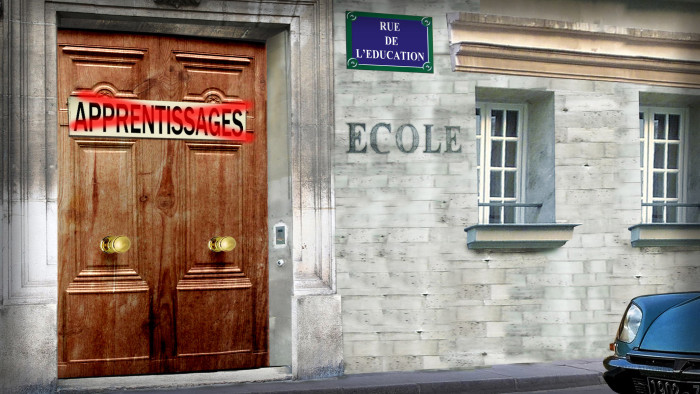French schools rethink their apprenticeships

Simply sign up to the Business education myFT Digest -- delivered directly to your inbox.
French management schools are rethinking their apprenticeship policies as competition for public funding increases. While some schools are already reducing the number of apprentices, other schools are getting around this problem by setting up apprenticeship-like schemes through scholarships, internships or temporary contracts.
“The main challenge for the development of apprenticeships is the funding issue,” says Pierre Tapie, president and dean of Essec Business School and head of the Confédération des Grandes Écoles, a body which represents over 200 higher education institutions in France. Essec has already reduced the number of apprenticeships it offers to 650 from its peak of 760 in 2010.
Apprenticeships in France make it possible for people aged 16 to 25 to combine academic learning with concrete professional experience. The system involves a working contract signed by the employer, the apprentice and the training institution. Originally designed for vocational courses in the French lycées, it was opened to higher education in the late 1980s.
Both employers and students benefit. Students do not have to pay tuition fees, and earn a percentage of the minimum wage for their work during their academic training. They also gain their first significant professional experience. Companies can source young talent and, during the course of the apprenticeship, receive government subsidies. They are also exempt from paying welfare contributions.
Growing popularity
Essec set up the first apprenticeship-based course in 1993 and since then there has been an enthusiastic adoption of apprenticeships by management schools.
A recent survey of CGE member business schools showed that respondents offered 4,400 apprenticeships accounting for 7 per cent of their student headcount. “There is considerable demand for apprenticeships from students as well as from companies,” says Jean-François Fiorina, vice-dean at Grenoble École de Management. His school currently has 381 students working and studying at the same time, of whom only a third are within the formal apprenticeship framework.
Funding pressure
Money for apprenticeships at business schools is scarce, however. Out of a total number of about 425,000 apprenticeships in France, only 4,400 are in business schools. Apprenticeships are funded through a complex mechanism involving central government, local government (régions) and companies.
According to figures released by the ministry of labour, public spending for apprenticeships amounted to €4.5bn in 2010, slightly up from €4.35bn a year earlier, although a huge jump on 2008’s spend of €3.66bn. However, business schools have not, on the whole, been the beneficiaries of the extra funding.
Apprenticeships are partly funded by a tax on corporations and while companies can channel part of their contribution to the schools they want to support, the bulk of the public spending allocation power resides with local governments.
Politics weighs in
Moreover, these régions have recently tended to favour the lower end of the academic spectrum as the country struggles to deal with high youth unemployment.
Higher education students, who represented a very small fraction of the total number of apprenticeships back in the early 1990s, now account for over a third of them.
Several surveys carried out by the Céreq, a French government think-tank which carries out research on education, skills and training, suggest apprenticeships make very little difference to the future employability of those in higher education, but help significantly those who achieve lower academic qualifications.
Critics of this view argue that apprenticeships also enable many students to gain access to expensive courses that they would otherwise be unable to follow. The Céreq statistics, they say, should be analysed with caution.
As competition for funding increases, the debate over what kind of schools and what kind of courses should be helped the most gets tougher but the general funding conundrum remains.
Comments